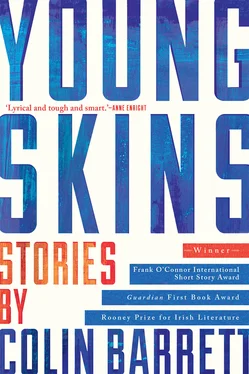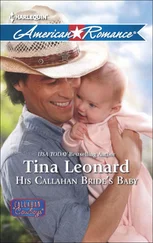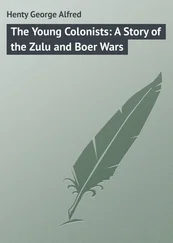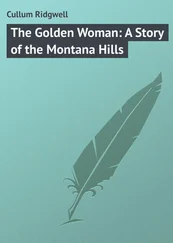‘You’ve killed me,’ he croaks.
He staggers back, and folds his big creaking knees, and puddles downward, dropping face forwards flat into the grass, arse proffered to the sky like a supplicant.
‘You’ve done it now,’ I say.
I toe-nudge the fetal Tug in the ribs. He jiggles lifelessly. The boy steps forward, mimics my action, toeing the loaf of Tug’s shoulder. The girls have gone silent.
‘How are you going to explain this to your mammy?’ I say.
The boy’s eyes begin to brim, even as he tries to keep the jaw jutted.
‘Ah, he’s set to start weeping,’ I say.
Tug, softhearted, can’t stay dead. He sputters, raises his head, grins. He eyes the boy. He hoists himself up.
‘Don’t be teary now, wee man,’ he says, ‘I was dead but I’m raised again.’
He lumbers up over the fence and out onto the bridge and I follow.
‘Goodbye King!’ Tug shouts.
As I pass him the boy scowlingly studies us, arms folded, aluminium spear resting against his shoulder.
‘If ye fall in there’s nothing I can do,’ he warns.
The bridge creaks beneath us. Halfway across, the thin gnarled branches of the dead tree spill over, reach like witches’ fingers for our faces, and we have to press and swat them out of our way.
‘So tell me, Tug,’ I say.
‘What?’
‘Tell me more about the Clancy kid. About these German lesbians.’
And Tug begins to talk, to theorise, and I’m not really listening, but that’s okay. As he babbles I take in the back of his bobbing head, the ridges and undulations of his shaven skull. I take in the deep vertical crease in the fat of his neck like a lipless grimace, and the mountainous span of his swaying shoulders. I think of the picture of the Clancy kid, scissored from a Sunday newspaper, that Tug keeps tacked to the cork board in his room. The picture is the famous, familiar one, a birthday-party snap, crêpe birthday crown snugged down over the Clancy kid’s fair head, big smile revealing the heartbreaking buck teeth, eyes wide, lost in the happy transport of the instant. I think of Marlene. I think of her sprog, so close to being mine. I think of her sundial navel, her belly so taut I can lay her on her back and bounce coins off it. We all have things we won’t let go of.
The beams of the crippled bridge warp and sing beneath us all the way over, and when we make it to the far shore and step back down onto solid earth, a surge of absurd gratitude flows through me. I reach out and pat Tug on the shoulder and turn to salute the boy king and his giggling girl entourage. But when I look back across the tumbling black turbulence of the water I see that the children are gone.
This was a summer night about a thousand years ago and myself and my cousin Matteen Judge were driving round and round and round the deserted oval green of Grove Park estate, waiting to see what we would see. It was another bath of a summer’s night, the moon low and full and hazed at the edges, as if the heat of the long day had thickened the medium of the air.
As was our custom, I manned the wheel while Matteen rode in rear, heaped like a flung coat in the far corner of the backseat. Nose glommed against the glass, he watched the rows of mute, single-storey houses slide by. There was a glaze on his forehead, a blue nauseated tinge to his pallor. Matteen was not well; inside, in his skull and chest, he was beset, I know, by that dolour of recollected feeling that can afflict any man who once loved some daffy yoke.
I knew something was up as soon as Matteen stepped out the door of his house. Cue case in hand, I could see it, the thick wade to his gait, like he was walking through setting concrete. At the window of the car, the chest of his T-shirt already clouded with sweat-sop, he looked at me as if he did not know me and said one word.
‘Sarah.’
‘What about her?’
‘Spin us up round Grove Park,’ he commanded.
Sarah Dignan. The daffy yoke Matteen once loved. Grove Park was where she was out of.
We’d been circling the estate for nigh on half an hour. Sometimes Matteen twitched at his trouser pocket, withdrew his phone, but he sent no message and made no call. I pictured nervous estate mothers eyeing us through the slit of their curtains.
Sarah’s house Matteen knew well, as did I of course, and Matteen was making a particular effort to pay it no particular mind.
They had been barely together, really, Matteen and Sarah. The series of fragile public excursions that constituted their official relationship lasted barely a fortnight. They began in Bleak Woods, where the boys and girls too young or too poor for the clubs gathered most Fridays, in the carpark adjacent to the woods. The point of the nights in Bleak Woods was to get the shift. Music chugged from the open door of a parked car and there were tinnies and smokes as those to shift were determined and paired off. Shifting was a curiously bloodless, routinised ritual, involving lengthy arbitration by the friends of the prospective pairings, who, as in arranged marriages, did not so much as get to say hello until they were shoved into each other’s arms and exhorted to take the dark walk into the maw of the woods. There, with that hello barely exchanged, each couple would find a sheltering bole to lean against or beneath, and commence their bodily negotiations.
Every lad wanted Sarah and it was Matteen got her. They went into the woods and when they came back he was pale with elation and, out of sight of the others, vomited with excitement.
I asked him what happened, how far did he get.
He just shook his head.
They went out on a few dates thereafter, Matteen with his hand gripped about Sarah’s wrist, his eyes brimming with the terror-tinged delight of a man who has gotten exactly what he wants. Nobody knew what to say to them. Unanimously flummoxed were we, Matteen’s pack, and envious. Matteen did not know what to say to Sarah either, and she, characteristically, said almost nothing. Soon enough, to our relief, it ended. Sarah euthanised it, proffered no explanation. Matteen, crushed, did not pursue one. Its demise was built into the thing’s inception, was the way he considered it at first; good things do not last, blah, blah. That was a year ago. And Matteen was fine for a bit, clinging to this stoic philosophical read, but the loss was hitting him constitutionally now.
Matteen rode in back for in addition to his burdens of sentiment he suffered acutely from travel sickness; the gentlest spin, no matter how brief or clement the run, was enough to upset his inner equilibrium and turn his complexion oyster. The sickness was made worse in passenger, watching the world quail and judder at close quarters through the windscreen. The roomy seclusion of the backseat, part bed, part carriage, with his frame pitched nearly horizontal, was the only way Matteen could travel and not feel overwhelmingly ill. Hence this arrangement, and me as chauffeur.
On the seat beside Matteen was his cue case. The case was customised, a pebbled leather and stainless steel-clasped affair in which Matteen spirited about his disassembled cues.
We were usually elsewhere by now. We were usually in town. We had a routine and the routine was this: each night I picked Matteen up from his home and conveyed him to Quillinan’s pub of Main Street, where Matteen made his money. He was the town’s premier pool shooter, nightly dispatching several challengers. Matteen’s reputation ensured a continuous supply of competitors, most of whom he had already beaten multiple times, all eager to stake a sum and watch in agonised reverence as he cleaned them out once more. Matteen was canny enough to lose now and then, purely to keep the flow of hopeful adversaries from petering out altogether, though he found it was those he destroyed most emphatically that were keenest to get back on the baize, to be destroyed all over again.
Читать дальше












